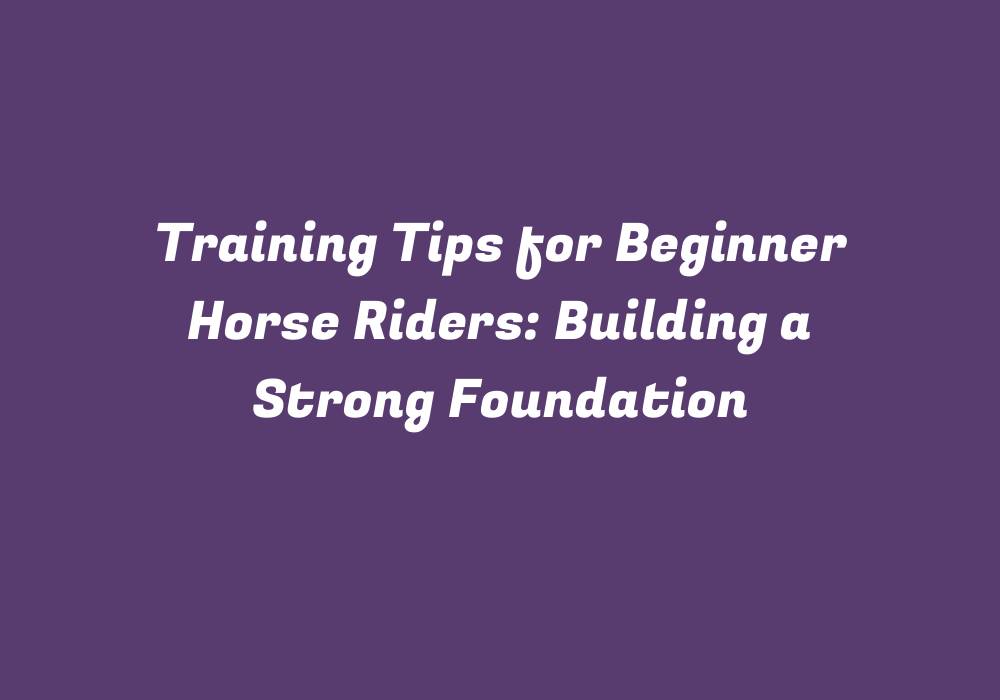Training Tips for Beginner Horse Riders: Building a Strong Foundation
Starting your journey as a horse rider can be an exciting yet overwhelming experience. With the right guidance and proper techniques, you can confidently embark on this fascinating adventure. Developing a strong foundation is essential for ensuring that both you and your equine partner thrive in your relationship. To assist you in your learning process, we’ve compiled a list of valuable training tips specifically tailored to beginner horse riders.
Patience Is Key
It cannot be emphasized enough that patience is an integral part of building a strong foundation for any horse rider. Learning the ropes takes time, and expecting quick results will only lead to frustration. Allow yourself to progress at your own pace and cherish each milestone in your journey.
Establish Trust
Building trust between you and your horse is the foundation of a successful relationship. Spend time grooming, handling, and interacting with your horse outside the saddle to establish a bond of mutual respect and understanding. By doing so, both you and your horse will feel comfortable and secure when working together in any situation.
Proper Mounting Techniques
Learn how to properly mount a horse without causing harm or discomfort. Start by securing your stirrups at the proper length and adjusting your tack to fit both you and your horse’s needs. Once in position, gently swing your right leg over the horse’s back and place your left foot in the corresponding stirrup. Slowly slide down onto the saddle, ensuring that your weight is distributed evenly between both of your seat bones.
Work on Balance
Maintaining balance is a fundamental skill for any horse rider, particularly when starting out. It’s crucial to practice standing in the stirrups without using the reins to support your upper body. This will help you develop a stronger core and improve coordination while riding. Balance also plays a significant role in maintaining control over your horse during turns and other movements.
Communicate with Your Horse
Effective communication between the rider and the horse is a vital aspect of building a strong foundation. Mastering a range of aids, such as voice commands, body language, and rein pressure, will help you convey your intentions to your horse clearly and effectively. In return, pay close attention to your horse’s response to your cues; this will help refine your communication skills and better understand your equine partner.
Master Essential Horse Handling Techniques
Horse handling techniques are essential for building trust, respect, and communication between the rider and their horse. Learn how to lead a horse safely, handle its feet for grooming or shoeing, and work on groundwork exercises to develop control and understanding of basic commands such as whoa, back up, and turn. The more comfortable you become with these techniques, the stronger your bond will be, leading to a harmonious riding experience.
Understand Horse Behavior
Learn about the various behaviors displayed by horses and how to recognize signs of fear or discomfort. By understanding and respecting their nature, you can prevent potential problems and ensure a safe environment for both you and your horse. Familiarize yourself with common equine language such as body language, facial expressions, and vocalizations, which will help you better connect with your horse throughout the learning process.
Focus on Riding Fundamentals
When beginning your riding journey, focus on mastering the basic fundamentals such as walking, trotting, and cantering. Practice these skills in various environments to build confidence and comfort while maintaining control over your horse’s movements. As you progress, incorporate more advanced maneuvers into your routine and continuously work towards fine-tuning your techniques.
Practice Regularly
Consistency is key to building a strong foundation in your horse riding journey. Dedicate time each week for practice sessions, whether it’s grooming, groundwork, or actual saddle time with your horse. Gradually increase the duration and intensity of your training as you gain more experience and confidence. Remember that persistence will eventually lead to growth and improvement.
Seek Professional Guidance
As a beginner rider, it’s crucial to seek guidance from experienced equine professionals such as trainers or coaches. They can offer valuable insight and hands-on instruction to help you develop your skills and deepen your understanding of horse riding. Additionally, joining an equestrian club or attending workshops may expose you to a diverse range of riders and horse training techniques.
Embrace Lifelong Learning
Horse riding is a continuous learning experience, and there’s always room for growth and improvement. Embrace the journey as it unfolds and remain open to new ideas and opportunities that may arise during your career. As you develop both individually and with your horse, you will build an unbreakable bond based on trust, respect, and dedication.
Conclusion
Building a strong foundation in your journey as a beginner horse rider is essential for fostering a lasting relationship with your equine partner. By incorporating patience, trust, proper techniques, communication, and consistent practice into your training routine, you can create an environment that nurtures growth and success while enjoying the incredible bond between rider and horse.
